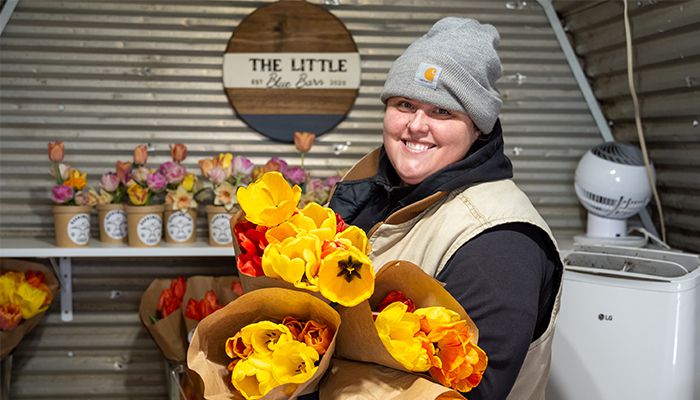In full bloom
Author
Published
5/13/2024
Fresh flowers, plants attractive alternative crops
Anyone strolling through a farmers market in Iowa has noticed the popularity of fresh-cut flowers, which are becoming more readily available as buyers supplement their fruits and vegetables, herbs, spices or baked goods with a stunning bouquet for the kitchen table or potted plant for the front stoop.
More Iowa farmers are turning to flowers as an alternative crop, providing dazzling displays for potential customers at farmers markets, rural farm stands or online marketplaces.
Meredith Nunnikhoven with Barnswallow Flowers in Oskaloosa specializes in sustainably growing and designing unique flowers in its outdoor setting. She shared her experiences with an engaged audience this spring at the 2024 Acres of Opportunity Conference, organized by the Iowa Farm Bureau.
Growers and producers with entrepreneurial spirit gathered at the third-annual conference to network and learn how to diversify their crop and livestock operations through guidance from business experts and farmer-peers.
Nunnikhoven said it’s no surprise that Iowa farmers are more interested in floriculture as it gains a following statewide.
While it’s not an easy agricultural path, the rewards can be plentiful, she said.
“Starting to farm a new crop with hundreds of species is extremely overwhelming, especially if you’re not armored with a toolkit of information, knowledge and mentorship,” Nunnikhoven admitted. “I’ve seen flower farms go under in five years because of this.
“(This) was my chance to help provide these farmers with applicable information in order to grow the industry for the betterment of all.”
History lesson
Barnswallow Flowers was born when Nunnikhoven and her late mother, Kerrilyn Loynachan Nunnikhoven, started growing flowers in 2011.
“At the time, I was working a corporate job in filmmaking, traveling across the U.S. to make movies and television shows as an IATSE production coordinator,” Nunnikhoven explained. “For almost 15 years from November to March, I would work on the road and April to October would come home to help my mom build Barnswallow Flowers.”
The duo took education seriously, attending countless online classes and reading a copious amount of literature while trialing flowers in outdoor, sustainable growing settings.
“We are now operating on three acres, providing chemical-free, fresh-cut flowers in many product forms to customers in our surrounding communities,” she said.
The business has grown to include seasonable offerings with custom-crafted bridal bouquets, the Little Blue Barn farmstand at Barnswallow, do-it-yourself buckets and pick-your-own options along with participation in Community Supported Agriculture (CSA), allowing consumers to connect directly with local farmers to enjoy fresh, seasonal products.

Pictured above: Tulips always are popular, and Barnswallow Flowers had an abundance ready for distribution this spring. PHOTO / CONRAD SCHMIDT
Popular varieties
Among the most popular varieties Iowa floriculture farmers grow each year are peonies, lisianthus, dahlias, zinnias, tulips, marigolds, daffodils and asiaticlilies. Each comes with its best-time-of-year growing season based on weather conditions.
For example, zinnias thrive in heat, while tulips offer early spring beauty and marigolds are more pest-resilient. Dahlias are among the most popular varieties as consumers are drawn to their stunning blooms, which make for gorgeous arrangements for the home.
Nunnikhoven said potential growers should keep in mind many factors when considering a delve into growing flowers.
“Never assume. Know the weather, research, test and develop, plan to save financially (and) don’t quit when the going gets tough,” she advised. Failure is part of the process, she said.
Conference participants peppered her with questions about everything from what products are used for pest control at Barnswallow Flowers to how to best germinate flowers or how far apart to plant flowers in a field.
“For flower farming, specifically, it all comes down to education and grit from the beginning, middle and beyond,” Nunnikhoven said. “I personally don’t do anything on a large scale that will affect me financially until I can actually trial it myself and see another operation doing it successfully.
“Failure is a part of that learning process and can be disappointing. When you are trying to farm not just one flower crop, but many, the work in this area of education will eventually pay off.”
Iowa’s farmers are smart and realize education is necessary, she said, and a part of the process that can’t be overlooked. “However, it’s also a reason flower farming is now a dominant agricultural space in Iowa as we are behind the curve when compared to states on the East and West Coasts,” she said.
“Iowans are woven from the same cloth that exudes ‘seeing is believing,’ so it will take some time for our community to grow. This is not a get-rich-quick industry and requires a lot of talent to not only grow, but design and sell a product if you are farmer florist.”
For more information on Iowa floriculture, visit https://barnswallowflowers.com/, https://iowaroadtrip.net/best-you-pick-flower-farms-in-iowa/, https://ascfgmembers.org or https://www.traveliowa.com/the-best-of-iowas-flower-farms/.
Want more news on this topic? Farm Bureau members may subscribe for a free email news service, featuring the farm and rural topics that interest them most!